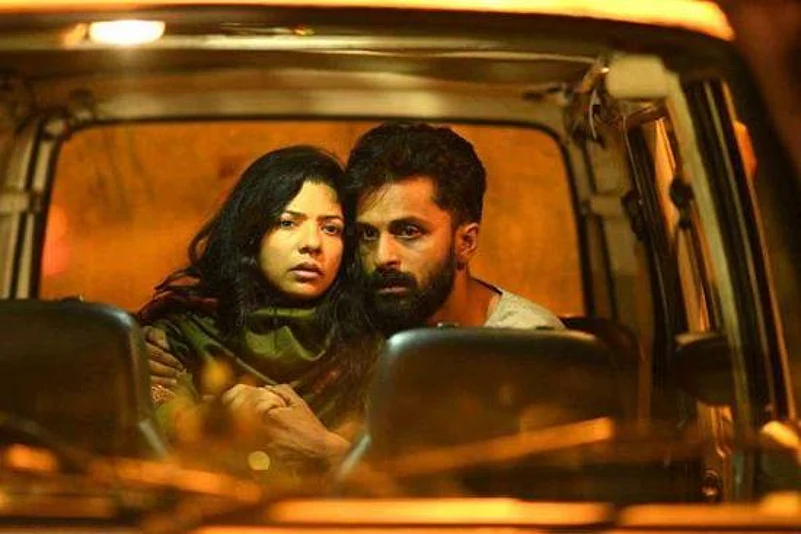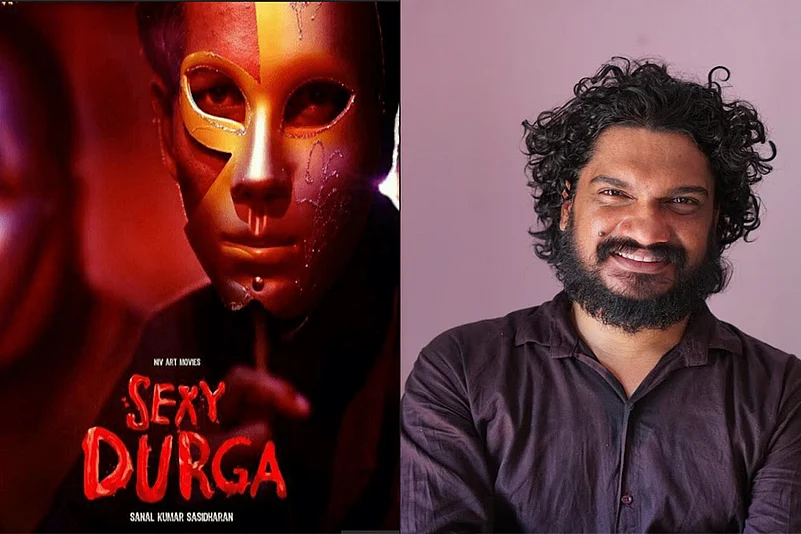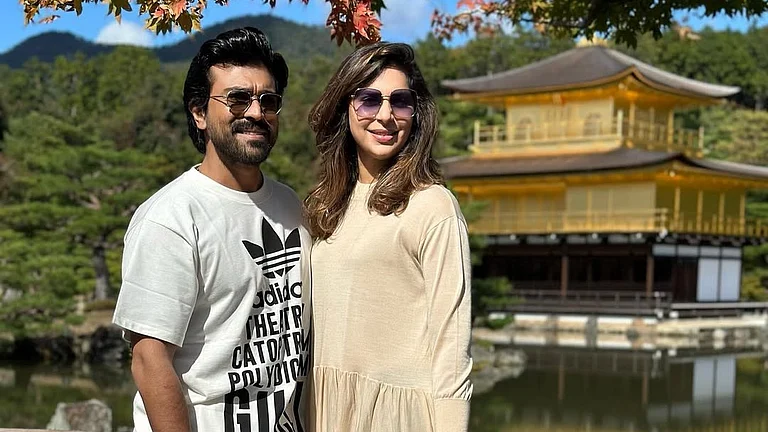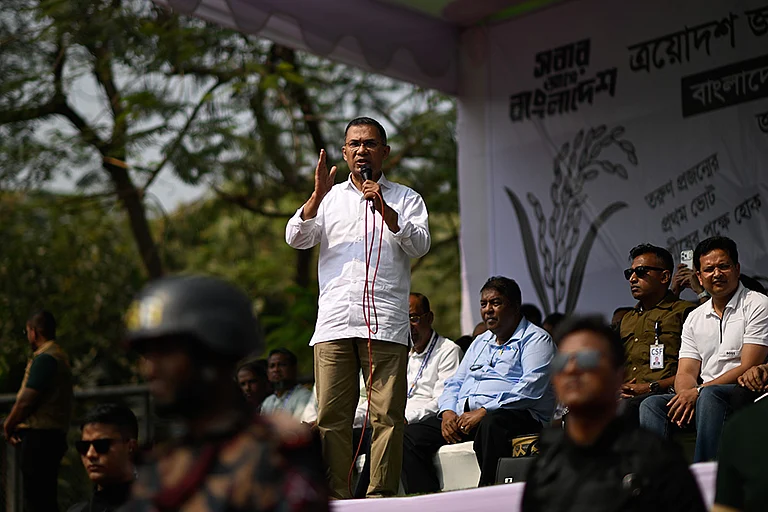40-year-old Malayalam film director Sanal Kumar Sasidharan's film S Durga was one of the two( the other is Ravi Jadhav’s Marathi film Nude) unceremoniously dropped from Panorama Section of the IFFI 2017 by the I&B ministry without consulting the jury. (A-13-member jury had chosen the 20 films to be viewed in the Panorama section from 178 films.) Protesting this move, three jury members including the jury chairmen Sujoy Ghosh resigned while 6 other members wrote to the I & B minister Smriti Irani. Outlook catches up with Sasidharan on the controversy, his film making and other flotsam from his life...
Kerala High Court has now ordered that S Durga be screened at IFFI at the Panorma section. Live Law reports: "Justice K. Vinod Chandran, the learned Single Judge who considered the matter, overruled the objections raised by the Ministry of Information and Broadcasting, and held that the CBFC certified version of the film was entitled to be screened." Sasidharan had petitioned the court last week.
The Ministry of I&B attempted to justify the exclusion by stating before the Court that the film’s original title ‘Sexy Durga’ was objectionable and offensive to religious sentiments.
How did you come into movies? Your early memory of a film that left a deep impression on you?
We had a C-class theatre named Geetha theatre in our village. My father was a film lover and we used to go to the theatre every Friday when the movie changed. My earliest memory of films is of Panchagni, a Malayalam film directed by Hariharan. I was 4 or 5 years old then. I was so impressed by the film, but my sister started weeping loudly whenever the heroine in the film was crying. We had to leave the theatre half-way through the film. I still remember her cries echoing through the theatre and people staring us. But the films, which provoked me, to become a film maker, were the ones I viewed on television. We had a black and white television at home and there was a Sunday program on Doordarshan where they aired a lot of art house movies- films of Adoor, Aravindan and other language films. I used to wait for Sundays to watch those silent and slow-paced films. I had to fight with my mother and sister to watch what they called the “pottankali” (dumb dance).
What were your early film ideas?
I had no film school education. From a very early age, I dreamt of becoming a film director. Even in school when someone asked me what I wanted to be, I had a ready answer: a filmmaker. People laughed at me when they heard this, because they knew I was from a poor family. After graduation, I told my father that I want to go to the Pune Film Institute. But he opposed the idea and told me I could go but I should not bother to come back. He wanted me to become a doctor. I failed his dreams so he thought I was good for nothing. Then I decided to win his favour and still make films. That’s how I became a lawyer and simultaneously tried my hand as an assistant director. I wrote almost ten scripts. Those who read them said that they were good but general public wouldn’t like them. Nobody was willing to produce those. That’s how I started a film society named Kazhcha Film Forum- a gathering of like-minded people and to make crowdfunded short films
Your transition from a director of short films to full length films.
My ultimate aim was to make feature films and feature length documentaries only. I heard a lot of people saying that there is not much difference between short and long films and both are similar as they are same medium. But for me short films never gave me the artistic satisfaction. I needed more complicated and multiple layered material. Feature films are much more complicated and challenging art form. It will challenge you in many ways. Judging the effectiveness of your own film will get more and more difficult when it increases in length. I enjoy that process. But it was very difficult for me to get a producer for my feature film ideas. Finally Kazhcha Film Forum, which I formed with my friends in 2001, came to support me by way of crowdsourcing. More than hundred of my friends contributed to the making of my first film Oraalppokkam/ Six Feet High.

Any incidents, that you particularly remember, during the making of your films?
Oraalppokkam was a real challenge. Now when I look back, it is a mad adventure. I decided to make a film but I did not have a producer and nor did I have money. Some of my friends who had supported me in my short films offered me help, that was my only base. They must have thought it would be a simple story. But I dreamt of a journey starting from Kerala and ending in Kedranath. When I related the storyline to Prakash Bare and Meena Kandasamy, the actors in the film, they were thrilled. Thus we started the film with some Rs 3 lakh. But we finished it without difficulties in terms of money. The Himalayan terrain is dangerous and it was not easy for the crew but we survived and finished the film. After Oraalppokkam, while thinking about my next film, I decided to go without a script. Ozhivu divasathe Kali (An off day game) is a famous short story in Malayalam. When I talked to Unni R, the author of the story, he was doubtful about making it into a full-length feature film. Initially, he wanted to see the script but when I explained my reading of the story connecting it to our democracy and judicial system, the lazy citizens making election day into another holiday, he agreed. He agreed to my idea to go forward without even a synopsis. Both films where study materials for me.
In both Ozhivu divasthante Kali and S Durga there was no written script. At any moment did it take a shape of its own?
I had no script for both the films. But in Ozhivu divasathe Kali, I had a well built story and I improvised a lot. In S. Durga, I did not have a single sheet of paper to follow while shooting. My making involves observations while filming and where it leads from there. I feel the pulse of the energy levels of the film while shooting itself. I believe that editing is the basic fundamental of film making. My mind edits even as I am shooting. It will send impulses which affect my decisions in the process of shooting. I am open to all kind of developments on the floor, I deny almost nothing. Whatever comes in my way I make use of it, maybe it is a dog on the street accidentally walking into the frame or a mistake which the actor commits which becomes an interesting component of the film. I am an observer rather than a maker, I just gently guide things to deviate in my way. It is like spinning a wheel and putting your finger gently to shape the clay, as in pottery.
The irony of the I & B ministry seeing only Goddess Durga and not the ordinary woman in your film S Durga?
This is the way our rulers are now, and sadly we can’t expect anything in the future. The government now is ruling for gods and goddesses, not for the citizens of our country. It will never see the thousands Durgas on the street but it will make a law to protect a deity named Durga if needed. In that case all the courts and the executives in our country will be equally vigilant to implement that law too. Sadly, this is our system. It doesn’t want anyone to talk about the reality.

The woman is deified as a goddess but the real woman has no rights...
This is actually our culture. We, Indians, never considered women as individuals. They are attachments of men and instruments of family for us. In order to deceive the rage and self respect of women, patriarchy has created this wicked idea of making her a goddess. Even we have made our prostitutes as Devadasis so that our morality won’t prick us. These ideas come from our brahminical thought process. Oppression of women in India starts from “Manusmriti” and now we have “Smriti Irani” as an icon of woman empowerment! Such a hypocritical system we have!
The helplessness of an artist such as you in the midst of this controversy. There is aggressive posturing-the state says it's guiding the people to see the right things but actually suppressing voices.
In a civilised society, and in the largest democracy, people should have at least the freedom to decide what is right and what is wrong. If at all the governments want to restrict, there must be a system. Now, the Censor Board is a system for restriction (whether it’s necessary I will not discuss here). I have gone through that system and my film got a censor certificate for unrestricted public screening.( There were only few mutes no cuts.) And now the government is duty bound to ensure the public screening of my film without any obstruction. But look what is happening. The government is taking a stand with the oppressors and denying me my right to screen the film. If these things are decided by a minister or a ministry arbitrarily, please, let us not call it democracy. Government is not the authority to decide what is right and what is wrong. This is pure oppression and absolute aberration from modernity. I don’t consider this as my personal issue or the case of rejecting a film. We have to see it in a much larger picture. It is a case of denial of freedom which the constitution has promised to a human being in return to become a loyal citizen of this country. This is like rejection of your constitutional rights. This is a crime. This government has committed a crime.
The hypocrisy of not booking the peddlers of sex videos (purportedly) of politicians, an intrusion into their privacy, while a serious film on women being harassed in public spaces, and safety of women is dropped from the IFFI 2017. Your comments.
This government is ruled by primitive ideas and it’s against modernity. It wants this country to go back to the age of bows and arrows. The idea of rejecting a film which is trying to make a serious discussion about the social mindset is ridiculous. It is very clear that they are not doing this for any particular reason. They are rejecting the film to appease some fringe elements which are blindly opposing the film. This government is passively supporting those elements, which is trying to derail this nation from its secular and democratic path. It is not new, they have been supporting passively at all times, see the attack against artists, killing of writers, killing of people in the name of beef trade. They do nothing against these crimes, instead they come out publicly with crocodile tears.
You got the Kerala State Film award in 2015 for best film for Orvivu Divasthae Kali. How do you think S Durga will be received?
Everywhere patriarchy is hidden. I don’t think that S Durga will be rewarded in Kerala. Kerala leftists really believe that they have become true left just by opposing demonetisation or GST, they have no problem in dumping a film selected by the jury and illegally rejected by the minister. Media and cultural leaders in Kerala have not raised their voice against this injustice. Also in the International film Festival of Kerala, they were trying to diminish the importance of S Durga by hiding it in a section called Malayalam cinema today. So I have no hope.
The numerous awards you received for S Durga...
It certainly feels good when my film gets recognition. But at the same time, I always look down to my feet. I know how weak I am and how many strong and talented people have walked on this earth without being recognised. I am tracing their foot prints on this muddy earth.
Something you really enjoyed...
One incident I really enjoyed and celebrated was the victory of AAP in Delhi. I thought that our country will be saved. But that movement died down. I felt sad when the party fell and became a Kejriwal party.


























